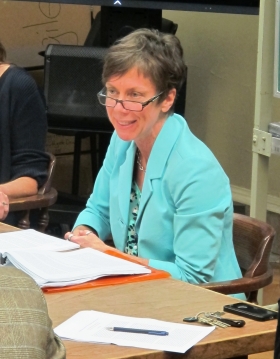By Peter Boisseau
The wave of protests called the “Arab Spring” were as much about bread as freedom, says Melbourne Law School Professor Anne Orford, and brought into sharp focus a “dark side” of free trade principles lawyers helped create two centuries ago and now could help solve.
The spike in food prices that fuelled unrest in the Middle East and around the world underscored the shaky premise of the current liberal free trade economic order, Orford told an audience of lawyers, academics and students Sept. 16 at the Faculty of Law’s 2014 Katherine Baker Memorial Lecture.
International law principles that prevail today through rule-making bodies such as the World Trade Organization were conceived in the 18th century, primarily to challenge “a particular kind of the social state” that consciously regulates for the common good, said Orford.
“The free trade principle has always been opposed to this form of a state and has always been opposed to government intervention,” she said. “It’s never just been concerned with government controls over imports and exports.”
The re-emergence of food security as an “unevenly distributed” global problem – one more keenly felt in developing countries – “is less about the availability of food and more about entitlement to food,” said Orford, who has penned influential articles on international law, is the author of an upcoming book and also a Core Faculty Member of the Harvard Institute for Global Law and Policy.
“At the risk of proving the old adage that to someone with a hammer everything looks like a nail, if a problem is global and it is about entitlement, then I’m going to say it is perhaps about international law, at least in part.”
The term “food security” implies there is a systemic problem the international community has to work together to solve.
While there is little agreement among scholars and policy makers about the current reasons behind the uneven distribution of food security, the legal framework that underpins the global economy can be re-shaped to help respond to the problem, as long as it recognizes the history and politics of free trade, she said.
That history – manifested today in international law, the WTO and a plethora of free trade agreements – “offers a historically contested answer to important questions of law and politics,” added Orford, one that has sparked the current impasse over agricultural issues that are part of the WTO’s Doha Round of negotiations.
Orford – whose lecture will be the centrepiece of a special upcoming issue of the University of Toronto’s student-run Journal of International Law and International Relations – was quick to clarify she does not blame free trade for famine or support its polar opposite, “food sovereignty” style policies.
“I don’t think either (philosophy) has been particularly helpful,” she said in response to a comment by U of T Professor Michael Trebilcock, an expert on law and economics, who pointed out the rise of free trade has coincided with the emergence of social states and improved living standards around the world.
What is worth noting, however, is the growing push to include agricultural in negotiations after governments had long-resisted reducing support and protection for rural communities as a beachhead against activists using the impact on the poor to stir unrest and threaten democracy.
“What I’m trying to explore is how we’ve come to the point where the solution to uneven food security is more free trade in the form of dismantling the social state,” said Orford, responding as well to questions from U of T Law Professor Kerry Rittich and Stephen Toope, incoming director of the Munk School of Global Affairs, about what solutions she favours.
“If we make visible the way that international law in fact structures the global economy,” Orford said, “then lawyers and legal experts might think about how we might go about redesigning the economic order” and come up with a different plan than current liberal free trade principles.
Exemptions for agriculture remain in place, Orford agreed, in response to a question from Professor Harriet Friedmann of the Munk School of Global Affairs, but she added that those exemptions are only for a select group of developed countries that are able to maintain them.
It is important to have a realistic sensibility about international trade, she told JD/MBA student Jeffrey Ma and JD student Sean Husband, after they noted the uneven benefits of free trade and how even its proponents seem selective about applying its principles.
Osgoode Hall Law School Professor Robert Wai questioned the “selective” application of free trade rules. Said Orford: “I’m actually pushing back against the idea that there are a variety of policies in play, and saying it’s more about embedding a way of thinking about what the state should do that’s got nothing to do with protection and everything to do with furthering its particular kind of logic.”
Orford also noted the language of the debate itself is political. The word “famine” is associated with a short-term emergency even hard-liners concede is an exception to free trade rules, she said, replying to a question from U of T Law student Randle DeFalco. However, the term “food security” implies there is a systemic problem the international community has to work together to solve, she added.

